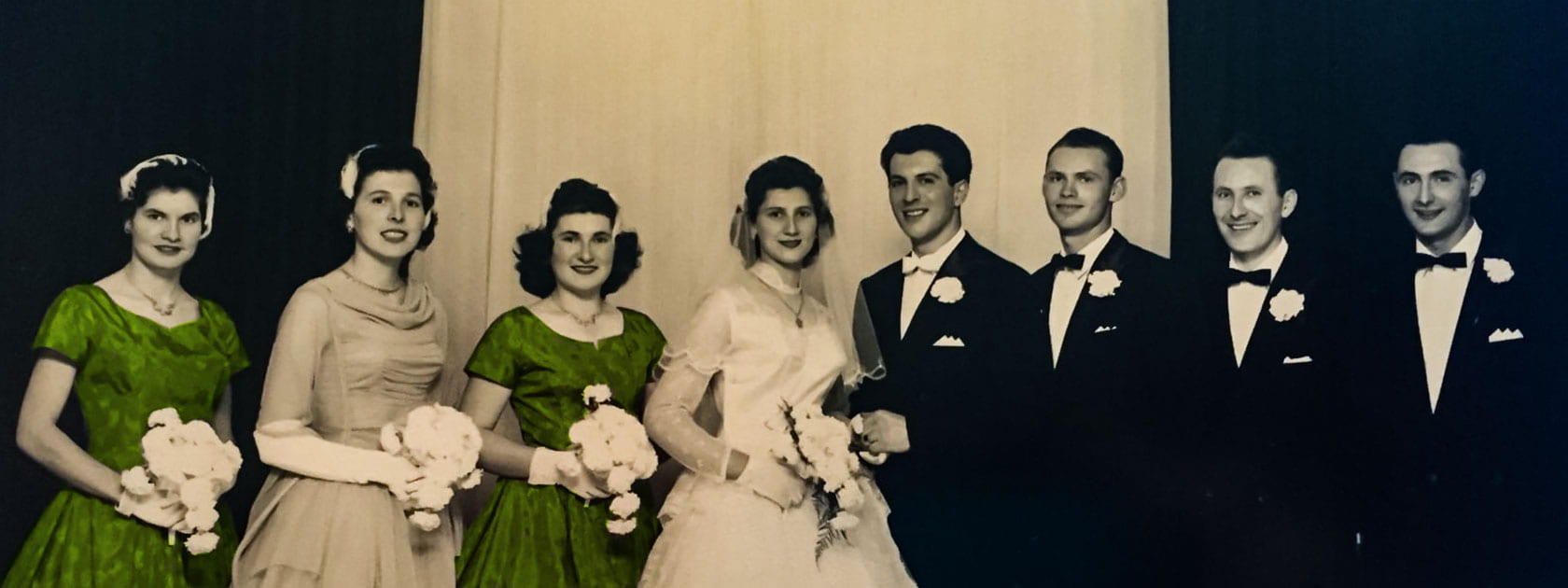Date
June 21, 2011
Maker
Columbus Centre
Accession#
ICEA2011.0038.0001
Interview With Eugene William Guagneli
Eugene William Guagneli is the son of Luisa Guagneli, one of four Italian Canadian women interned in 1940 at Kingston Penitentiary. At the time of his mother’s arrest he was a teenager about to begin high school in Niagara Falls, Ontario. Along with his father and uncle, Guagneli was declared an enemy alien, although he was born in Canada. He recalls his mother’s involvement in the Italian community, mainly with the church and the Orders Sons of Italy Ladies Auxiliary. She also taught Italian language classes. He believes that his mother was targeted by an informant due to her standing in the community, rather than any real political support for fascism or the Italian government. He describes the day the Royal Canadian Mounted Police (RCMP) arrested his mother in their home, including rough treatment at the hands of one of the officers. He also notes her detainment at the Don Jail in Toronto as being very difficult and that the family had little knowledge about her whereabouts at the time. After her release his mother did not speak about the experience and what he knows is mostly from conversations he overheard.
In this opening clip, Eugene Guagneli introduces himself and describes the neighbourhood he grew up in Niagara Falls.
Eugene Guagneli speaks about his parents, mentioning where they were born in Italy and when they migrated to Canada.
Eugene Guagneli briefly describes the ethnic makeup of his neighbourhood as a young child.
In this clip Eugene Guagneli briefly mentions the name of his school, as well as the church his family attended.
Eugene Guagneli describes the various local Italian organizations his parents were involved with. His father was a member of the Order Sons of Italy, while his mother was involved with the Order Sons of Italy Ladies Auxiliary, among other groups, where she taught Italian classes.
Eugene Guagneli talks about the family of Rev. Libero Sauro who was also interned during World War II. Prior to the war the families were very close, with the children often playing together. This friendship continued even after the Sauros moved to Toronto.
In this clip Eugene Guagneli describes his memories of June 10, 1940. He mentions that several men searched his family home and confiscated a bunch of material, including his notes from school and a project he had recently completed. He also describes how his mother was treated by the officers prior to her being arrested and taken away.
Eugene Guagneli describes how his mother was first taken to the Don Jail in Toronto before she was sent to Kingston Penitentiary for Women. He mentions that her detention at the Don Jail was particularly difficult for her and the other internee from Wellad, Verna Lo Bosco.
In this clip Eugene Guagneli mentions that the family did not receive any information about Luisa’s whereabouts until she was transferred to Kingston Penitentiary. Once she was in Kingston, they were able to write letters and Eugene and his father even went to visit his mother.
Eugene Guagneli briefly describes his home life while his mother was interned. Eugene and his sister were looked after by his aunt while his father worked. He also mentions that for a period of time his father had difficulty finding employment.
Eugene Guagneli briefly mentions that he didn’t face any discrimination at school while his mother was interned since very few people knew she was interned. However, he does mention that one of his teachers did change his name during the war years.
Eugene Guagneli explains why his mother could not have been a fascist supporter. He mentions his mother refused to donate her gold wedding band to support Italy’s war efforts in Ethiopia and that she also refused a trip to Italy that she believed was being financed by the fascist government. He also mentions that there is a long history of anti-fascism in the the Marche region of Italy where she immigrated from.
Eugene Guagneli describes his mother’s homecoming and how she found it difficult to adjust at first.
In this clip Eugene Guagneli describes how his mother was very reluctant to speak about her internment experience even years after her release.
Eugene Guagneli remembers missing his mother when she was away and that his father had no explanation for why she was taken.
Eugene Guagneli discusses the reasons he believes his mother might have been interned.
Eugene Guagneli describes his life, schooling and career after the war years.
In this clip Eugene Guagneli speaks of his teaching career. Early in his career he taught around Ontario and even taught for the Department of National Defence in Germany for a number of years.
Eugene Guagneli briefly describes the later years of both of his parents.
In this clip Eugene Guagneli speaks about a family member who was taken prisoner of war in North Africa during World War II. After the war was over his mother sponsored him and his family and they settled in Southern Ontario where he eventually became the custodian of the floral clock in Queenston.
Eugene Guagneli briefly discusses who was home the day the RCMP came to his home looking for his mother.
During the period that his mother was interned, Eugene Guagneli and his father were designated enemy aliens. In this clip Eugene speaks about the procedures they had to endure as enemy aliens and his father’s feelings on the topic.
Eugene Guagneli describes the discrimination he and his family faced for being Italian Canadian during the war years.
Eugene Guagneli describes one incident in school where he was discriminated against because of his Italian heritage.
Eugene Guagneli further elaborates on the enemy alien designation and what this meant for him and his family. He describes his parents having to go register with the local authorities but does not recall the authorities ever questioning his father for his involvement with the Order Sons of Italy.



